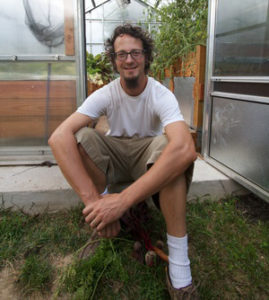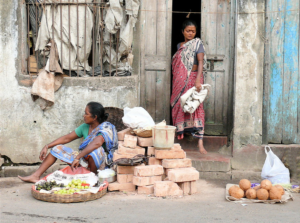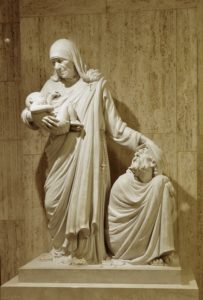They devoted themselves to the apostles’ teaching and to fellowship, to the breaking of bread and to prayer. Everyone was filled with awe at the many wonders and signs performed by the apostles. All the believers were together and had everything in common. They sold property and possessions to give anyone who had need. Every day they continued to meet together in the temple courts. They broke bread in their homes and ate together with glad and sincere hearts, praising God and enjoying the favor of all the people. And the Lord added to their number daily those who were being saved. (Acts 2:42-47)
One of the first things that happened as the church was born that first Pentecost, 2000 years ago, is that Christians started sharing everything they had. They worshipped in their homes. The gospel was lived out of dinner tables and living rooms.
Scripture says, “No one claimed any of their possessions were their own, but they shared everything they had … and there were no needy persons among them … They put their offerings at the feet of the apostles, and they were distributed as people had need [and] there were no needy persons among them.”
This witness has so much to teach our world.
We are living in a time of unprecedented economic disparity between the rich and the poor, the haves and the have-nots. Masses live in poverty so that a handful of people can live as they wish. The world’s three richest people own more than the combined economies of 48 countries. The average CEO in the U.S. is making 335 times the average worker.
In contrast, it was the ethic of the early Christians that no one had a right to more than they need while others have less. Basil the Great said, “When someone steals another’s clothes, we call them a thief. Should we not give the same name to one who could clothe the naked and does not?”
But here’s the deal. Generosity cannot be forced or legislated. It has to be provoked by love. That’s why we’re not talking about a new form of socialism, or communism, or anything that ends in “-ism.” Redistribution comes from community, not before community. The early Christians did not have community because they shared stuff — just the opposite. They shared stuff because they had community. It is simply what happens when we are driven by a love ethic to love our neighbor as ourselves.
The deepest tragedy in our world is not that rich folks don’t care about poor folks. The tragedy is that rich folks don’t know poor folks. Statistics are not enough. Campaigns are not enough. We will never make poverty history until we first make poverty personal. That’s what happened in the early church — they had a new vision of family. They no longer had “rich” and “poor,” but only “brother” and “sister.”
Jesus is not saying to the poor, “Come find the church.” Jesus is saying to the church, “Go into the world. Find me where I am hungry. And homeless. And naked. And in prison.”
In the end, the final judgment according to Jesus is this. All of us will be gathered before God, and we will be asked a few questions — not a doctrinal test about eschatology, inerrancy of Scripture. We will not be asked if we believe Mary was a virgin, or if the world was really made in seven days. We will be asked, “When I was hungry, did you feed me? When I was a stranger, did you welcome me in? When I was sick, did you take care of me?”
The true test of our faith is how it is expressed in love and compassion to the people in this world. And it’s not that our works earn our salvation — our works demonstrate our salvation.
But here’s something important: It is not about guilt. Jesus did not come to give us guilt, but to give us life. Someone once said to Mother Teresa, “I wouldn’t do that for a million dollars.” And she responded by saying, “Neither would I. But I would gladly do it for Christ.”
In the end, what we are talking about is the life we are made for: joy, love, and freedom.
I will never forget learning this from a homeless kid in India. Every week we would throw a party for the street kids, kids 8-10 years old who were homeless, begging all day to survive. One week, one of the kids I had grown close to told me it was his birthday, so I got him an ice cream. He was so excited, he stared at it mesmerized. But what he did next was brilliant. He yelled at all the other kids and told them to come over. He lined them up and gave them all a lick. His instinct was, “This is so good, I can’t keep it for myself.”
In the end, that’s what this whole idea of generosity is all about. Not guilt. It’s about the joy of sharing. It’s about realizing the good things in life — like ice cream — are too good to keep for ourselves.











At the young age of 71 I’m just coming to learn that as many times as I say I love you, it’s not enough, yet one “act” of love can make a lasting difference. A poem came to heart as I read this wonderful article;
Love spoken has little effect
At times, to change life’s perspect
Just words, though so often most true
Can leave us just empty with rue
But give me a cold cup of water
With heart wanting only to bless
And you show me what only was said
Becomes loves truth not just in my head.
So true, Mike – and thanks for the lovely poem!